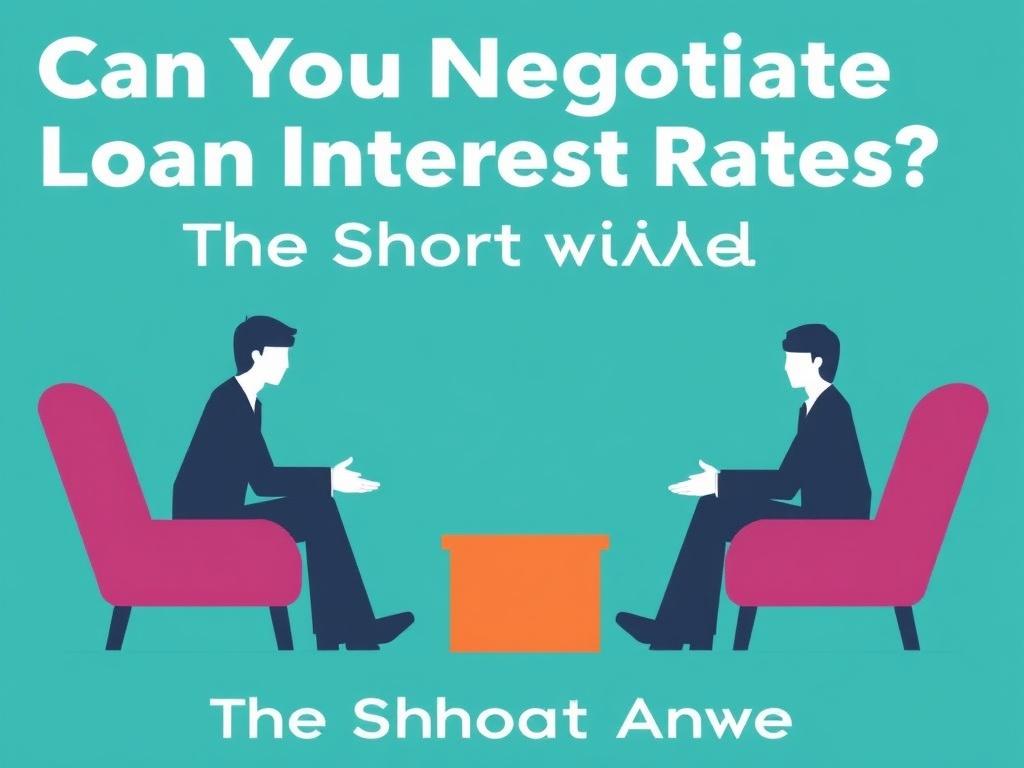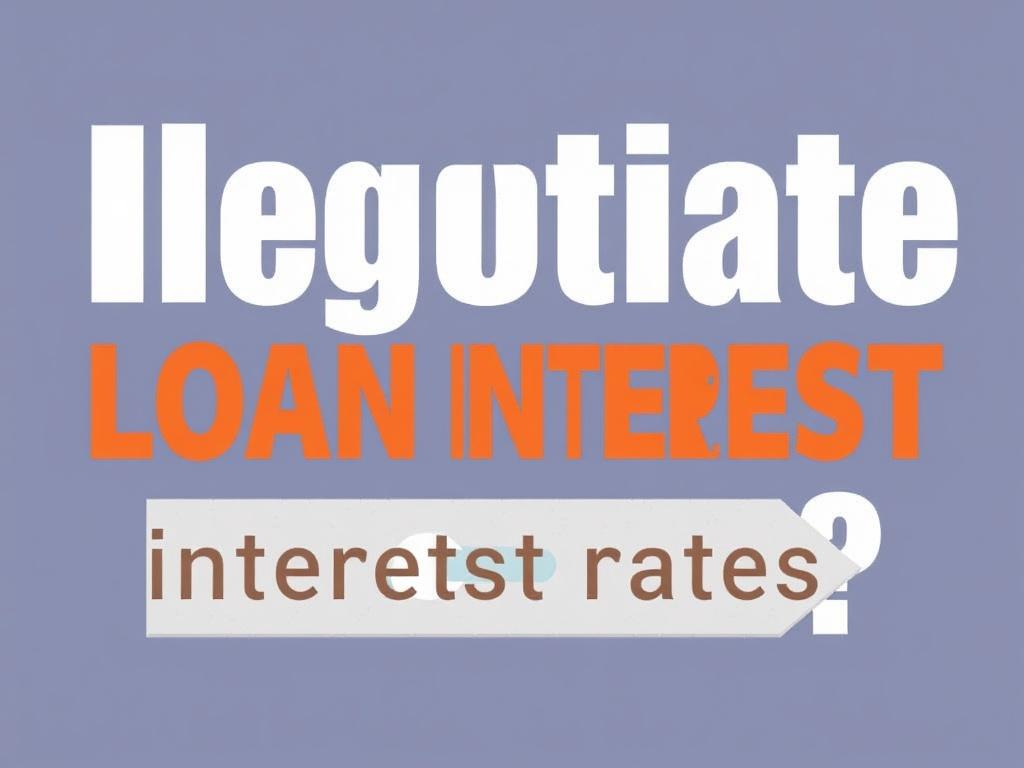SQLITE NOT INSTALLED
When it comes to borrowing money, whether for a car, a home, or even personal expenses, one question often lingers in people’s minds: can you negotiate loan interest rates? The answer is a resounding yes. Many borrowers don’t realize just how much power they have in negotiating the terms of their loans, especially the interest rate, which can save them thousands of dollars over the life of the loan. Understanding how to approach this negotiation, what factors affect interest rates, and what tactics work best can put you in a stronger financial position.
Borrowers sometimes assume that loan interest rates are fixed and non-negotiable, but that isn’t always the case. Financial institutions, banks, credit unions, and even online lenders often have some flexibility depending on your creditworthiness, existing relationship with the lender, and the overall market conditions. This article will walk you through everything you need to know about negotiating loan interest rates. You’ll learn what lenders look for, ways to prepare before you negotiate, and smart strategies that increase your chances of success.
Содержание
Understanding Loan Interest Rates: What Are You Negotiating?

Before launching into negotiation tips, it’s essential to understand what loan interest rates actually represent. Simply put, the interest rate is the cost you pay for borrowing money. It is expressed as a percentage of the loan amount, usually calculated annually, and influences your monthly payments as well as the total amount you repay over time.
Loan interest rates come in two primary forms:
- Fixed interest rates: These stay the same throughout the duration of the loan, offering predictability in your payments.
- Variable or adjustable interest rates: These can change periodically based on market conditions, meaning your payments might fluctuate.
When you negotiate loan interest rates, your goal is to secure the lowest possible rate to reduce the cost of borrowing. Keep in mind that the interest rate affects not just monthly payments but also how much you end up paying overall. Even a slight reduction in the interest rate could translate into significant savings, especially for long-term loans like mortgages.
What Factors Influence Your Loan Interest Rate?
Lenders don’t randomly pick numbers when setting interest rates. Several factors influence the rate you’re offered:
| Factor | Description | Impact on Interest Rate |
|---|---|---|
| Credit Score | A numerical representation of your creditworthiness, based on your credit history. | Higher credit scores typically qualify for lower interest rates. |
| Loan Amount | The total amount you are borrowing. | Larger loans might have different rate structures or require stronger credit profiles. |
| Loan Term | The length of time to repay the loan. | Shorter terms usually have lower interest rates, but higher monthly payments. |
| Type of Loan | Mortgages, auto loans, personal loans, etc., each has a unique risk profile. | Secured loans often have lower interest rates than unsecured loans. |
| Market Conditions | Current economic factors, including central bank rates and inflation. | Rates can fluctuate based on the economy and monetary policy. |
| Relationship with Lender | Existing accounts, deposit history, and overall financial relationship. | Loyal or long-standing customers may receive better terms. |
Knowing these factors helps you identify your bargaining chips when negotiating loan interest rates.
Can You Negotiate Loan Interest Rates? The Short Answer

To the question “can you negotiate loan interest rates?” the clear answer is yes, but with some qualifications. Loan interest rates are negotiable in many situations, but it depends heavily on the lender, the type of loan, and your individual financial profile.
Situations Where You Can Negotiate Loan Interest Rates
Negotiation is most feasible when:
- Your credit score is solid. Lenders want low-risk borrowers and are often willing to offer better rates to those with strong credit histories.
- Your loan amount is substantial. Larger loans present more business for lenders, giving you leverage.
- You have competitive offers from other lenders. Comparing rates allows you to ask your preferred lender to match or beat those offers.
- You have established a relationship with your lender. Banks and credit unions appreciate loyal customers and might offer discounted rates.
- Market rates are favorable. In times of lower central bank rates, lenders may be more flexible on interest rates.
When It’s Harder to Negotiate Loan Interest Rates
In some cases, negotiating loan interest rates becomes more challenging:
- Your credit score is low or borderline. Lenders view this as higher risk and may have less room to reduce rates.
- Your loan is small and unsecured. Smaller loans with no collateral tend to have less flexible rates.
- Standardized loans like federal student loans. Government-backed loans usually come with fixed interest rates that cannot be negotiated.
- Automated online lenders using AI models to instantly approve loans may have set rate structures without human negotiation.
Recognizing the right context for your negotiation efforts can save you time and help you focus on areas where you have influence.
How to Prepare for Negotiating Loan Interest Rates
Preparation is half the battle when it comes to successfully negotiating loan interest rates. Here’s a step-by-step guide to get ready before you start talking with lenders.
1. Know Your Credit Score and Credit Report
Before you reach out to any lender, check your credit score and review your credit report. You can get a free credit report annually from the three major credit bureaus (Experian, TransUnion, and Equifax). This helps you understand your creditworthiness and identify any errors or issues to fix before negotiating.
A higher credit score generally gives you leverage for lower interest rates. Knowing your score also sets realistic expectations.
2. Compare Loan Options and Interest Rates from Multiple Sources
Gather loan quotes from at least three different lenders. These could include banks, credit unions, and online lenders. Comparing rates and terms helps you benchmark what’s available and gives you a negotiating tool — you can mention other offers to your preferred lender and ask them to match or beat those rates.
3. Consider Loan Term and Amount
Decide on the loan amount and term that fits your budget and goals. Knowing these details upfront makes negotiations clearer. Sometimes a slightly lower loan amount or shorter term can lead to better interest rates.
4. Prepare Your Financial Documents
Lenders may ask for proof of income, employment verification, tax returns, and bank statements. Having these documents organized shows you are serious and ready, which can improve your credibility during negotiation.
5. Build Your Case for a Lower Rate
Think about your strengths as a borrower: steady income, good credit score, loyalty to the bank, or competitive offers. Highlight these when you discuss loan interest rates.
Effective Strategies for Negotiating Loan Interest Rates
Now that you’re prepared, how do you actually negotiate loan interest rates? Here are some tactics that lenders respond to.
1. Be Polite and Professional
Approach negotiations with a friendly, respectful attitude. Building rapport with the loan officer or representative can go a long way. Remember, they have guidelines but can often work with you within those limits.
2. Ask Directly About Lower Rates or Discounts
Sometimes the simplest way is the best: ask if the lender can offer a lower interest rate or interest rate discount. You might be surprised how often they say yes, especially if you present your case clearly.
3. Leverage Competitive Offers
Mention the rates you’ve been quoted by other lenders. This puts pressure on your preferred lender to offer you a better deal to keep your business.
4. Highlight Your Creditworthiness
If your credit score is strong or you have a long banking relationship with the lender, remind them. Pointing out your reliability can encourage them to reward you with lower rates.
5. Consider Shorter Loan Terms
Ask if shortening the loan term can lower the interest rate. Sometimes lenders are more flexible when you opt for shorter repayment periods because it reduces their risk.
6. Negotiate Other Loan Costs
If the lender is firm on the interest rate, try negotiating other fees such as origination fees, processing fees, or prepayment penalties. Reducing these costs can save money overall.
Common Misconceptions About Negotiating Loan Interest Rates
Several myths can discourage borrowers from negotiating loan interest rates. Let’s clear them up.
Myth 1: Interest Rates Are Set in Stone
Many people think rates are fixed and non-negotiable, but lenders typically have some room, especially for qualified borrowers.
Myth 2: Only People with Perfect Credit Can Negotiate
While good credit helps, people with moderate credit scores can sometimes negotiate better terms by shopping around or improving other factors.
Myth 3: Negotiating Will Hurt Your Chances of Loan Approval
Asking for a better rate professionally usually won’t hurt your approval chances. It might even show lenders you’re serious and informed.
Tools and Resources to Help You Negotiate Loan Interest Rates

You don’t have to negotiate blindly. Several online resources and tools can help you:
| Tool/Resource | What It Does | How It Helps |
|---|---|---|
| Credit Score Check Services | Provide your current credit score and report details. | Helps you know your credit standing before negotiation. |
| Loan Comparison Websites | Show loan offers from multiple lenders in one place. | Allows you to compare interest rates quickly. |
| Loan Calculators | Calculate monthly payments and total interest. | Helps you understand the financial impact of rates. |
| Online Forums and Consumer Reviews | Share experiences on lender flexibility and negotiation. | Provides insights and tips from other borrowers. |
These tools make you a more informed and confident negotiator.
When to Walk Away: Knowing Your Limits
Negotiating loan interest rates is worthwhile, but sometimes lenders won’t budge. Knowing when to walk away is important to avoid settling for unfavorable terms. If you’ve done your homework, gotten multiple offers, and the lender still refuses to lower the rate or fees, it might be better to choose another lender or rethink borrowing altogether.
Final Thoughts on Negotiating Loan Interest Rates
Negotiating loan interest rates is not just possible—it’s a smart financial move that many borrowers overlook. By understanding what influences interest rates, preparing carefully, using strategic negotiation techniques, and leveraging competitive offers, you can significantly reduce borrowing costs. Remember, lenders often prefer to keep good customers and may be willing to work with you to find a rate that fits your financial situation. Don’t hesitate to ask, compare offers, and stand firm on getting the best deal. Your proactive approach could save you money and set the foundation for better financial health.
Опубликовано: 23 July 2025 Кредитрон – блог о кредитах, финансах и прочих реверансах
Кредитрон – блог о кредитах, финансах и прочих реверансах

